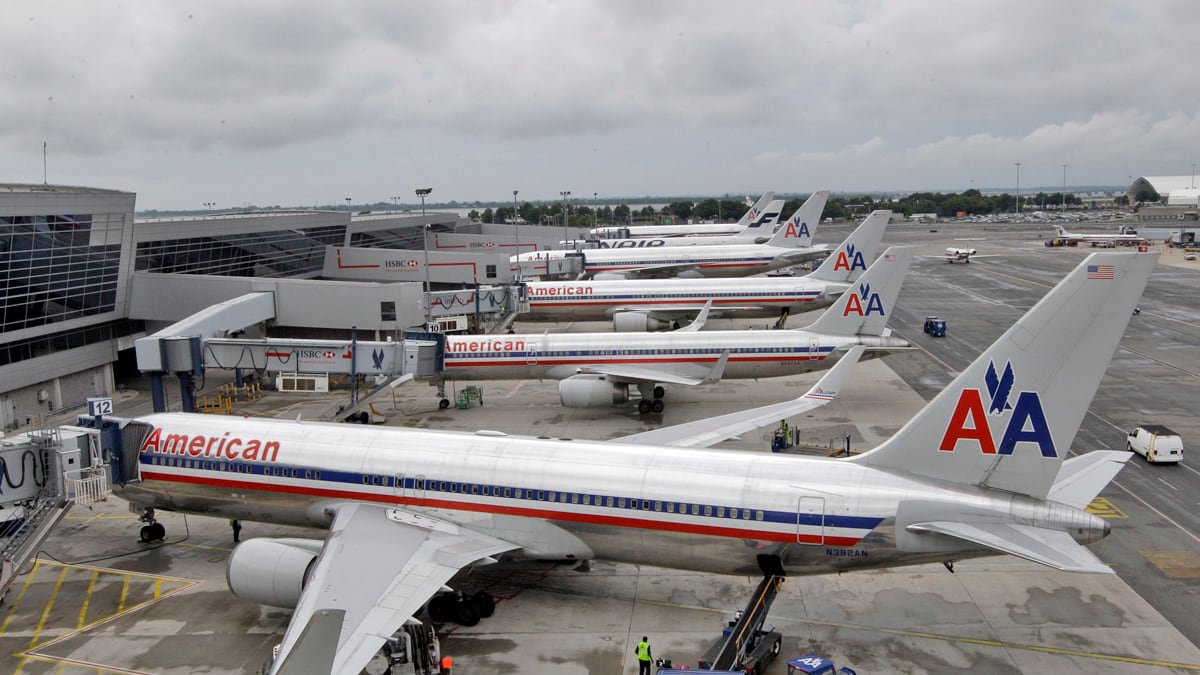When the hell did everyone suddenly become an aviation expert?
On Sept. 29, The New York Times published a caustic diatribe against American Airlines by the novelist Gary Shteyngart. Shteyngart had an unpleasant experience on American while returning from Paris, and decided that, as he put it, the airline “should no longer be flying across the Atlantic.”
A few days later, the paper published a letter to the editor by Phil Meyerowitz, of Metuchen, New Jersey, who picked up where Shteyngart left off, railing about delays, rude airline workers, overpriced tickets, and so on.
Then on Tuesday, Slate’s Matt Yglesias took his turn skewering American—in the process caricaturing the responsibilities of airline pilots.
These sorts of rants have become painfully trite and predictable, riffing on the public’s well-established hostility toward All Things Airline. My duties as a pilot and air travel writer have made me well aware of the contempt people feel for airlines. The U.S. commercial air sector is about as unloved an industry as exists, short of the people who manufacture landmines and leg-hold traps for coyotes. Some of that contempt is justified, but much of it is not. Let’s take a closer look.
First: Shteyngart.
I need to say up front that Gary Shteyngart is among my literary heroes. I have read and enjoyed each of his novels—"Absurdistan" is perhaps the funniest book I've ever read—and it pains me to say anything bad about him. But his harangue against American Airlines was at best gratuitous and at worst idiotic.
All of us know that AA isn't having the smoothest go of things as it attempts to navigate its way out of Chapter 11 bankruptcy. The carrier has imposed harsh salary sanctions against its pilots, sparking an in-house backlash; there was that damaging scandal over loose seats, and so on. But what Shteyngart describes is the sort of dysfunction that occasionally plagues even the best and most solvent carrier. He suffered a long delay in Paris, followed by a maintenance problem requiring an inflight turn-back. American then messed up the logistics of re-routing its stranded passengers.
It was an arduous ordeal, I'm sure, and some of what happened was probably inexcusable. However, it just as easily could have happened on United, US Airways, or any other carrier. All are known to drop the ball on occasion, and/or endure some bad luck. I'm not ready to put the blame on AA's recent unrest, as Shteyngart does—certainly not for things like the doors of an airport shuttle bus not opening properly.

Moreover, to state categorically that American Airlines should cease transatlantic flying is ridiculous. Shteyngart’s opening paragraph reads, "You, American Airlines, should no longer be flying across the Atlantic. You do not have the know-how. You do not have the equipment." Perhaps we're not meant to take this at face value, but I didn’t detect much irony. American Airlines has been flying across the Atlantic for decades, and operates dozens of daily long-haul flights between the U.S. and Europe, Latin America and Asia. I'm sorry, Gary, that your journey was such a drag, but other than this particular experience, and in spite of your ample talents as a writer, what exactly is your expertise when it comes to the operational aspects of transoceanic flying?
(Also, not to quibble, Gary, but London-Heathrow is not the world's worst airport. This one is.)
With respect to safety implications generally—something we've been hearing much about since the AA bankruptcy—people need to remember how much airlines stand to lose should something terrible happen. A single disaster can destroy an airline outright—particularly one that is already ailing. It happened, to some extent, with Pan Am and the bombing of Flight 103. Add negligence into the mix, and liability can run into the billions. Hard as it might be for some of you to accept, airlines do not play fast and loose with passengers' lives.
Slate’s Matt Yglesias also took American to the woodshed, albeit more thoughtfully than Shteyngart did. I don't have terribly much to say about Yglesias’s article, which made some valuable points, but my knuckles definitely grew white at the following:
"Part of what a good pilot does," Yglesias wrote, "is know the difference between something that needs to be fixed right now and something that can wait until fixing it won’t cause massive delays or tons of missed connections. When American angered its pilots, they struck back by doing the reverse."
So, are readers to understand that a pilot can make subjective decisions on broken parts? I can, on my own, determine which malfunctioning systems are OK to fly with, and which are not? That's what a "good" pilot does?
Really, that's how it works? Are you sure?
It’s a bit more complicated than that. Like Shteyngart's summary judgment that American ought not to be flying overseas, this is a rather grotesque simplification—both of a pilot's job and of the employee-management dynamic at AA.
Onward to Mr. Meyerowitz of Metuchen.
Responding to Shteyngart’s screed, Meyerowitz unloaded a general, all-out complaint about commercial flying in general. Among his gripes: “delayed flights, rude workers, overpriced tickets, fewer available flights, fewer seating choices, crowded and dirty planes, security fiascos and humiliations, incorrect or no information regarding rescheduling, and nickel and diming on everything."
Is there something here we haven't heard already? Did something so trite really belong on the letters page of the world's most important newspaper?
Flying is "overpriced”? To the contrary, flying is underpriced if anything, which is partly why carriers have such a hard time breaking even. The price of a ticket, adjusted for inflation, has fallen sharply since the industry was deregulated in 1979. By 2010, fares had dropped to their lowest levels ever. In 1939 it cost the equivalent of more than $6,000 for a round-trip ticket between New York and France. As recently as the 1970s, flying from New York to Hawaii cost nearly $3,000. It’s only in the past 20 years or so that flying as we know it—as an affordable form of mass transit—has come to exist.
As for that nickel-and-diming, travelers are well acquainted with the airlines' fondness for the practice known as “unbundling”—$50 for checked luggage, $6 for a sandwich wrap, etc. This can be annoying, but these ancillaries were never "free”; they were included in the price of your ticket, which used to be higher. Unbundling is also a smart idea in that passengers looking for perks can buy them, absorbing a higher share of the cost. Isn’t this better than higher prices across the board?
Cabin comfort? Load factors—i.e., the percentage of seats occupied—are up, but planes today are roughly as crowded as they were 10, 15, 20 or 25 years ago. Contrary to popular perception, cabin configurations, including seat pitch, have tightened only marginally in the years since deregulation. Some passengers might remember PeoplExpress of the early 1980s, or the old Laker Airways "SkyTrain,” whose knee-breaking cabins make today's jets seem luxurious.
Delays? About 85 percent of flights arrive on time, according to the Department of Transportation. That number could and should be higher, but it's hardly a terrible one.
Dirty planes? I’ll give Meyerowitz something on this one. Cabins of U.S. jetliners aren't nearly as well groomed as their foreign counterparts. The days when cleaners would individually wipe down tray tables prior to every departure have gone the way of three-course meals in economy. Blame it on lack of effort, underpaid staff, or the super-fast turnarounds that are now industry standard; regardless, yes, our planes should be cleaner.
Fewer available flights? Hardly. In fact there are more planes flying to more destinations than ever before. Indeed this is one of the reasons we have as many delays as we do: airlines have saturated the airspace system in their attempts to offer as many flights to as many cities as possible. One can travel between almost any two airports in America with, at worst, a single stopover. A few decades ago, flying even halfway across the country often entailed awkward transfers through two or more cities. Traveling to Europe or Asia once meant having to depart from one of a small handful of U.S. gateways. Today you can fly overseas directly from numerous smaller hubs—Pittsburgh, Portland, Denver, Charlotte—saving considerable time.
As for those rude workers, who "would rather be working elsewhere," I'm not sure what to say. It's true that tens of thousands of airline workers have seen their pay and benefits slashed. But count me among those who enjoy our jobs greatly, and go out of our way to be courteous and respectful to passengers.
Where Meyerowitz deserves full credit is on security. Those familiar with my writing already know my feelings about TSA and the absurd and wasteful protocols put in place after September 11. I blame the government, an irresponsible media and a lazy populace that seems to accept anything in the name of security. But the airlines, too, share some of the responsibility, having watched this happen with a minimum of protest.
Notably absent from his tirade, however, is any mention of safety. Globally, flying has never been safer than it is right now. There are twice as many planes in the sky, carrying twice as many passengers, as there were 25 years ago, yet the accident rate (fatalities per miles flown) continues to fall markedly. Here in the United States there has not been a large-scale crash involving a legacy airline since 2001. That's the longest such streak in the entire history of commercial aviation. Say what you want of airline customer service, but carriers have maintained an astonishingly good safety record even in the throes of extreme fiscal distress.
The downsides of flying are duly noted. But taken together, we've got an air transport system that is remarkably safe, mostly reliable, and generally affordable for everybody. Is that really so awful?
And I really hope American emerges from bankruptcy quickly, if for no other reason than I won't have to read any more half-baked commentary from people who have no idea what they're talking about.





